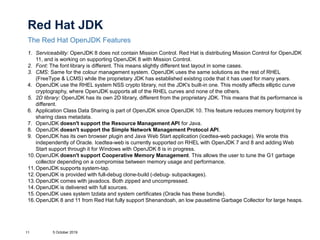

- Redhat openjdk 15 how to#
- Redhat openjdk 15 install#
- Redhat openjdk 15 software#
- Redhat openjdk 15 download#
To overwrite the already existing files the command is: # ln -sf /opt/jdk-13/bin/* /usr/bin/ If some files already exist it is your own decision if you want to overwrite them (it may cause some problems). This creates symbolic links for each new jdk-13/bin file in the /usr/bin folder.

To resolve this problem you can do the following (if you want to stick with this installation), I suggest to verify before if any of those new jdk-13/bin/files already exists in the /usr/bin folder (overwriting them without caution may cause problems): # ln -s /opt/jdk-13/bin/* /usr/bin/ This will resolve your problem but will create many, in fact, you won’t be able to call any of the java commands. To clear the line you can call your text editor using the complete path from the root to it and then edit the file, for example “ /bin/vi /etc/environment” and then log in again (or reboot) to source it. Please read everything before copy-pasting any command.įor everyone who has this problem you can just clear the “ Export PATH=$PATH:/opt/jdk-13/bin” line (leave the definition of JAVA_HOME there). # java -versionĬongratulations! You’ve successfully installed the latest version of Oracle OpenJDK in RHEL, CentOS, Fedora, and Rocky Linux/ AlmaLinux to develop and run Java applications. Just, enter the number to set the default Java version on the system.įinally, check the Java version. Sample Output There are 2 programs which provide 'java'.Ģ java-latest-openjdk.x86_64 (/usr/lib/jvm/java-16-openjdk-16.0.1.0.86_64/bin/java)Įnter to keep the current selection, or type selection number: 2 If you have more than one Java version installed on the system, you need to set the default version using the alternatives command as shown. Java HotSpot(TM) 64-Bit Server VM (build 17.0.1+12-LTS-39, mixed mode, sharing) Java(TM) SE Runtime Environment (build 17.0.1+12-LTS-39) Next, confirm the installed Java version.
Redhat openjdk 15 install#
Install the package using the following command: # yum localinstall jdk-17_linux-圆4_bin.rpm # wget -no-check-certificate -c -header "Cookie: oraclelicense=accept-securebackup-cookie"
Redhat openjdk 15 download#
To install Oracle OpenJDK 17, you need to download the production-ready OpenJDK 17 from the Java SE Downloads page or run the following wget command to download and install it as shown. Install Oracle OpenJDK 17 in CentOS/RHEL and Fedora OpenJDK 64-Bit Server VM 21.3 (build 16.0.1+9, mixed mode, sharing) OpenJDK Runtime Environment 21.3 (build 16.0.1+9) Install OpenJDK 16 in CentOS/RHEL and FedoraĪt the time of writing this article, OpenJDK 16 is the currently available version to be installed using the following commands from the EPEL repository.
Redhat openjdk 15 how to#
In this article, we will show you how to install OpenJDK 16 from the EPEL repository and Oracle OpenJDK 17 (the latest release) using binary packages in RHEL-based Linux distributions such as CentOS, Fedora, Rocky Linux, and AlmaLinux to develop and run Java applications. Note: If you are looking for an open-source and free JDK version, install the OpenJDK which provides the same features and performance as Oracle JDK under the GPL license.
Redhat openjdk 15 software#
If you want to develop software applications for Java, you need to install the Oracle Java Development Kit (JDK), which comes with a complete JRE package with tools for developing, debugging, and monitoring Java applications and it is an Oracle’s supported Java SE (Standard Edition) version.

You mostly need the Java Runtime Environment (JRE), a collection of software components used to run Java applications on the Linux machine. To run Java-based applications, you must have Java installed on your server. Java is a secure, stable, and well-known, general-purpose programming language and computing technology platform with many interconnected capabilities.


 0 kommentar(er)
0 kommentar(er)
